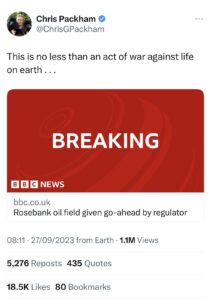Thea Phillips
The UK has given the go-ahead for one of its biggest new oil and gas fields in years, the North Sea Rosebank Oil field, saying energy security was the priority despite opposition from environmentalists.
Prime Minister Rishi Sunak said it was the “right long-term decision” for securing oil supplies in the UK.
But critics said it would harm climate change targets and not reduce bills.
The Rosebank oil field has been a topic of controversy since September 2022, when it was first proposed by Equinor, the Norwegian oil and gas giant that will be responsible for the development of the field.
What is the Rosebank oil field?
Rosebank is the name given to the UK’s largest and deepest undeveloped oil and gas field. Its reserves lie a kilometre underwater and can hold between 300 and 400 million barrels of oil.
Situated just 80 miles off the west coast of Shetland, it is expected to begin producing oil by 2026, with most of its oil aiming to be extracted between 2026 and 2028.
An approximate 70,000 barrels of oil will be shipped per day during this period, after which, production will slow.
According to the BBC, approximately 245 million barrels will be produced in the first five years and the remaining 55 million will be extracted between 2032 and 2051.
Why was the Rosebank approved?
The oil and gas industry remains one of the biggest contributors to the UK economy, providing 200,000 jobs and expecting to welcome £50 billion in tax revenues over the next five years.
However, according to Reuters, oil and gas output has reduced “by two thirds in the past 20 years”.
The war in Ukraine has put a spotlight on UK energy security while Brexit has stirred discussions about UK self-sufficiency – approving a large oil field appears to be the government’s way of addressing these concerns.
Despite concerns from over 50 MPs from all significant political parties about potential environmental damage, regulators North Sea Transition Authority have given the green light, emphasising the importance of prioritising the UK’s economic position and energy security.
“Rosebank may provide little benefit to the UK and pay a large environmental price at a later date.”
The Conservative Party’s Energy Security Minister Claire Coutinho said: “We will continue to back the UK’s oil and gas industry to underpin our energy security, grow our economy and help us deliver the transition to cheaper, cleaner energy.”
While the Conservative Party insist that this decision will grant economic prosperity and secure the UK’s energy sources, activists, economic specialists and various MPs have all shed light on the reality of this controversial move.
Numerous sources have implied that Rosebank may provide little benefit to the UK and pay a large environmental price at a later date.
Will Rosebank benefit the UK?
Equinor has claimed that Rosebank will cover 8% of daily energy needs.
However, #StopCambo, an organisation protesting against the Cambo oil field located 78 miles northwest of the Shetland Islands, claims that most of the oil produced by Rosebank may not be appropriate for UK requirements. Therefore, up to 80% of it is expected to be exported and used elsewhere.
Although it may strengthen our economy through exportation, it will do little to provide the country with fuel and will not lower prices.
The BBC confirmed that the oil produced “will be sold at world market prices, so the project will not cut energy prices for UK consumers”.
In an article written months before the approval, #StopCambo revealed that the UK will pay for the oil field’s development but will not financially benefit from the profits:“Equinor holds an 80% stake in the field, and the Israeli firm Ithaca Energy (Cambo’s owner) holds the remaining 20% stake. The UK public, however, would carry almost all the costs (91%) of developing Rosebank, while these oil companies take the profits.”
“the UK public could spend more than £750 million on the investment and see almost no financial profits.”
The UK will hand over a generous £3.75 billion in tax breaks to Equinor and its partners to develop the project and, when Rosebank’s oil reserves are distributed, the predicted tax payments will also hit the UK economy.
#StopCambo estimates that the UK public could spend more than £750 million on the investment and see almost no financial profits.
“If approved, Rosebank will make the UK poorer but the Norwegian state richer,” say #StopCambo.
Will Rosebank affect the environment?
Not only is this project a costly one for the UK economy, but it is also predicted to worsen our climate crisis significantly.
The oil field is estimated to release up to 200 tonnes of carbon dioxide, which, over its lifespan could equate to the collective emissions generated from the 28 lowest-income countries.
The North Sea Transition Authority have insisted that Rosebank’s emissions were taken into account when decision-making processes were underway.
Despite Equinor and the Tories insisting that the Rosebank project will support the UK’s net-zero target, UNISON claims that the “decision makes achieving net-zero much harder.” General Secretary Christina McAnea describes it as “yet another setback in the battle against climate change”.
The Green Party’s Caroline Lucas has described the approval as “morally obscene” and demands that the Conservative party be “held accountable”.
BREAKING – #Rosebank oilfield just given go-ahead – the greatest act of environmental vandalism in my lifetime, causing emissions equal to 28 lowest income countries, busting #climate targets & doing nothing for energy security since vast majority is for export #climatecriminals
— Caroline Lucas (@CarolineLucas) September 27, 2023
Furthermore, Uplift, an organisation campaigning for a fossil-free UK, argues that the approval proves that Rishi Sunak “couldn’t care less about climate change.”
“Climate plans in tatters” (The Guardian), “climate-wrecking” (The Ecologist), and “death sentence” (The Independent) are just three examples of the phrases used by different publications to report this news.
Broadcaster Chris Packham has described the approval as an “act of war against life on Earth” in a now-deleted post on X.

The Green Party, the Conservative Party, and JustStopOil were contacted for questioning but did not respond in time for publication.
READ NEXT:
-
GRETA THUNBERG JOINS SECOND LONDON OIL PROTEST DAYS AFTER ARREST
-
AUSTRALIAN MINING TYCOON THREATENS TO PULL UK INVESTMENT OVER OIL RUSH
-
MINISTERS ACCUSED OF ENVIRONMENTAL CRIMES OVER OIL DRILLING
Featured image courtesy of Alisdare Hickson via Flickr. No changes were made to this image. Image license found here.

